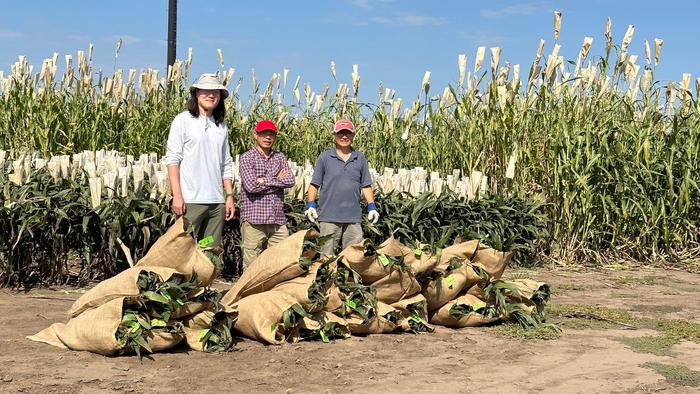Researchers at the Center for Advanced Bioenergy and Bioproducts Innovation (CABBI) have unveiled a groundbreaking advancement in sustainable agriculture: the development of an innovative sorghum variant that significantly surpasses traditional soybeans in oil production capabilities. This new sorghum variant emerges as a promising candidate for clean, renewable fuels, showcasing its potential to revolutionize the biofuels industry amid an escalating global demand for sustainable energy sources. By rethinking the agricultural approach to oil production, CABBI scientists have tapped into a critical need for alternative feedstocks that can effectively address future energy challenges.
A recent study published in the prestigious journal Plant Biotechnology Journal illustrates the successful application of a lab-to-field pipeline designed to optimize the oil production potential of sorghum. While targeting field conditions, the researchers engineered the plants to achieve remarkable TAG accumulation—up to 5.5% dry weight in leaves and 3.5% in stems, positioning these results at an astonishing 78 times and 58 times greater than that of unmodified sorghum. Such increases suggest that the engineered sorghum could generate approximately 1.4 times more oil per hectare compared to soybeans, offering a robust feedstock alternative for renewable fuel production.
Edgar Cahoon, the Director of the Center for Plant Science Innovation at the University of Nebraska and a lead author of the research, emphasizes that this achievement is the result of extensive collaboration and serious commitment to addressing global energy challenges through innovation in crop engineering. Alongside Cahoon, several other experts contributed to this project, showcasing a multidisciplinary approach that bridges molecular genetics and agronomic science to facilitate the practical application of biotechnological advances in the field.
This innovative sorghum is distinct from the oil-rich seeds and fruits characteristic of traditional oil crops. Instead, TAG typically accumulates in the vegetative organs of plants, such as leaves and stems, as a natural stress response to membrane damage. To enable the accumulation of oil in this sorghum variant, the researchers employed a strategic approach termed “push-pull-protect.” This methodology involves introducing specific genes that push more carbon from photosynthesis into oil production, pull fatty acids into the TAG molecules, and protect the stored oil from degradation. By focusing efforts on sorghum, which is known for its resilience against heat and drought, the research team could refine existing biotechnological strategies.
The implications of these advancements reach beyond the biofuels industry. The engineered oil sorghum could potentially unveil new markets and income streams for farmers, aligning economic growth with the movement toward renewable energy and sustainability. Bio-processing of oil extracted from sorghum might open avenues to invigorate rural economies and stimulate interest in sustainable agricultural practices.
In their quest to bolster oil yields further, the research team plans to investigate techniques to reach CABBI’s goal of attaining crops with at least 10% TAG by dry weight. Achieving this ambitious target would represent a significant leap forward in biofuel feedstock production, laying the groundwork for sustainable alternatives to fossil fuels. To refine their approach, the team will conduct comprehensive analyses of the metabolic outcomes derived from their push-pull-protect strategy, utilizing cutting-edge techniques such as whole transcriptome shotgun sequencing.
Through this extensive analysis, scientists discovered that their engineered oil sorghum lines exhibited increased production of enzymes that degrade lipids, including TAG. This unexpected finding raised important questions about the balance between lipid synthesis and degradation within the engineered plants. By closely examining these metabolic processes, the research team aims to formulate refined engineering strategies that could enhance oil levels, thereby ensuring the reliability and sustainability of sorghum as a biofuel feedstock.
As the research team continues to push the boundaries of sustainable agriculture, the newly engineered oil sorghum lines stand at the forefront of meeting global energy needs. Their remarkable production capabilities suggest a significant departure from conventional oil crops, cementing their role as key players in the pursuit of sustainable, renewable energy solutions. With ongoing research aimed at improving yield and efficiency, scientists remain optimistic about the potential for this oil sorghum to contribute meaningfully to the bioeconomy while supporting rural livelihoods.
In conclusion, the pioneering efforts showcased in the development of this new sorghum variant spotlight the vital intersection of biotechnology, energy needs, and agricultural advancement. With the world’s energy landscape evolving at a rapid pace, innovations of this nature are not merely beneficial—they are imperative. Advancements in engineered crops like this sorghum variant may represent an essential stepping stone in the broader transition toward a sustainable energy future. Researchers remain dedicated to the ongoing exploration of bioenergy solutions that marry environmental health with economic resilience, ensuring that the agricultural sector plays a prominent role in achieving global sustainability goals.
Subject of Research: Engineering high-biomass sorghum for oil production
Article Title: Development of vegetative oil sorghum: From lab-to-field
News Publication Date: 30-Nov-2024
Web References: http://dx.doi.org/10.1111/pbi.14527
References: None provided
Image Credits: Edgar Cahoon
Keywords: Sorghum, Genome engineering, Genomic analysis, Plant sciences, Genetics, Agricultural engineering.





